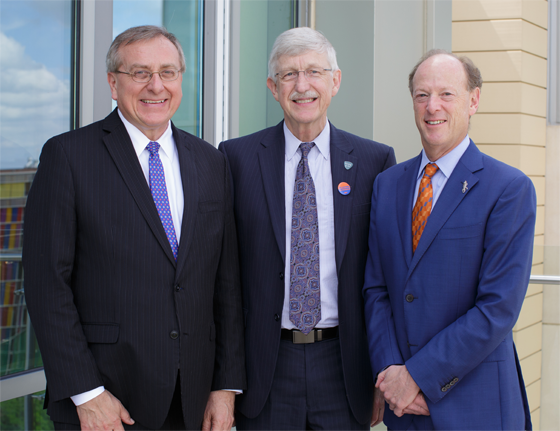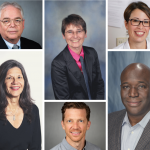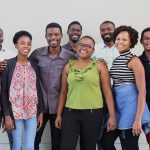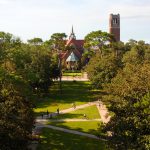
NIH director lauds innovation, encourages bold thinking in visit to UF campus
A recent spike in federal spending is an energizing opportunity for researchers, the nation’s top scientist said during a visit on April 2 to the University of Florida.
The National Institutes of Health’s 8.8 percent budget increase gives scientists a chance to be bold, to pursue disease cures more quickly and to take risks in pursuit of major scientific discoveries, said NIH Director Francis Collins, M.D.
In fact, Collins said a cure for sickle cell anemia may not be far off. The disease affects blood flow by altering the shape of red blood cells.
“I’m going to predict that five years from now, we will have cured sickle cell disease,’’ he said. “It’s about time we had a molecular cure. I think we can do that.”
Collins spoke to a packed house of several hundred scientists, staff and health-science students Monday morning at the UF College of Medicine’s George T. Harrell, M.D., Medical Education Building.
To cure sickle cell anemia and make major advances against other diseases, scientists should be empowered to take risks and to ask big, fundamental questions, Collins said. That’s where the NIH and its newly robust funding can help. The agency has an additional $3 billion in funding for the 2018 fiscal year, and the largest amount overall since 2003.
“That means there are all kinds of things we can go faster on. We can develop that universal influenza vaccine, which we need if we’re going to be protected against a future pandemic or even just to get rid of annual flu shots that don’t work very well. We can come up with strategies to use gene editing to begin to find cures for those thousands of genetic disorders where we know the precise molecular defect, but we haven’t got a solution that will work in terms of therapeutics,” he said.
Earlier in the day, Collins visited the Sid Martin Biotechnology Institute. He had much praise for the UF-run incubator in Alachua that has created more than 2,200 high-tech jobs and served more than 100 startup companies in biotechnology, biomedicine and bioagriculture.
“There are very few universities that have had the kind of vision to make sure their discoveries get taken to that next step,” Collins said.
NIH-funded research at UF has grown in recent years. Overall NIH research awards at UF were $161 million in the 2017 fiscal year, up from $141.8 million in 2016. At UF Health, the university’s academic health center, NIH research funding has grown for seven consecutive years, going from $87.5 million in fiscal year 2010 to $141.8 million in 2017.
Following his speech, Collins held a “fireside’’ chat with David S. Guzick, M.D., Ph.D., senior vice president for health affairs at UF and president of UF Health, and took questions from faculty and students. Guzick acknowledged the agency’s financial support as well as the enthusiasm among the many scientists in the audience.
The event was organized by U.S. Rep. Ted Yoho, R-Gainesville, who along with UF President Kent Fuchs accompanied Collins to the tour of the Sid Martin Biotechnology Institute and who addressed the audience in the Harrell building.
Some of the approximately two dozen students who met with Collins privately later in the morning said they were happy he took the time to inspire the next generation of physicians and researchers.
Stephen Chrzanowski, Ph.D., a medical student who graduates in May, said, “I think it was, more than anything, a nice, intimate way for him to really reach out to young trainees. His infectious enthusiasm really permeated us all.”
He said Collins emphasized that they will all frequently encounter failure as researchers. That is the nature of science.
Collins, Chrzanowski said, wanted the students to know, “That’s OK. It’s expected. When it all goes right and you discover something and you are the only person in the world with that little bit of knowledge, that is a very rewarding experience.”
The most important aspect of NIH-funded research is how it helps UF Health scientists make discoveries that improve lives and prevent and cure diseases, Guzick said.
“Growth of NIH-funded grants increases the national stature of the University of Florida. It also creates thousands of jobs in our local community. Biomedical research is a powerful economic engine for our community,” Guzick said.
The continued growth of NIH-funded research is a result of the state of Florida creating and funding recruitment programs to advance biomedical and life sciences research, said Michael L. Good, M.D., dean of the UF College of Medicine. Established UF Health researchers have been successfully competing for larger NIH grants based on their promising research, while new grants are flowing to recent faculty hired through preeminence initiatives meant to boost UF’s research and academic standings.
At UF Health, the NIH supports innovative and important research initiatives, including the Clinical and Translational Science Institute, which accelerates the process of transforming scientific discoveries into improved health care. Good said notable examples of NIH-funded work at UF include first-in-human clinical trials of cancer immunology to treat brain tumors (Duane Mitchell M.D., Ph.D, department of neurosurgery), discovering the genetic underpinnings of neurodegenerative diseases such as Lou Gehrig’s disease (http://neurogenetics.med.ufl.edu/faculty/dr-laura-p-w-ranum/) and important research on inherited muscle diseases (http://research.pediatrics.med.ufl.edu/researchers/research-faculty/barry-byrne/).
Collins said scientific research is at a pivotal, technology-driven moment that was unimaginable just a decade ago.
“Ultimately, we’re involved in this kind of science because we want to help people,’’ he said. “We can do that at a pace and a speed right now that is unprecedented. But it means getting ourselves really organized to provide hope for people who have been waiting a really long time.”
Juan Hincapie-Castillo, who is studying for a doctorate in pharmacy, said Collins encouraged students to follow their muse and not to lose focus on the things that excite them in their research or life.
“That was his big theme. What is the big question that excites you? … He was very enthusiastic in encouraging young researchers to find their niche and explore that. He thinks the creation of new knowledge is the ultimate driving factor.”
Hincapie-Castillo said Collins also talked about his own spirituality and how he reconciles his faith with his science. In fact, Hincapie-Castillo said he was embarrassed he hadn’t known that Collins wrote a book on the topic, “The Language of God: A scientist presents evidence for belief.”
“Now I want to read the book,” Hincapie-Castillo said.
Credits:
By: Doug Bennett and Bill Levesque
Published Date: April 2, 2018







